Related Research Articles

Romanticism was an artistic and intellectual movement that originated in Europe towards the end of the 18th century. In most parts of Europe it was at its peak from approximately 1800 to 1850. Romanticism was characterized by its emphasis on emotion and individualism, clandestine literature, and paganism. Romantic thinkers idealized nature, were often suspicious of industrialization and rationalism, and frequently glorified the Middle Ages by depicting them in moralistic, idealized forms. Romanticism was partly a reaction to the Industrial Revolution, and the prevailing ideology of the Age of Enlightenment, especially the scientific rationalization of Nature. It was embodied most strongly in the visual arts, music, and literature; it also had a major impact on historiography, education, chess, social sciences and the natural sciences. It had a significant and complex effect on politics: Romantic thinking influenced conservatism, liberalism, radicalism and nationalism.

William Butler Yeats was an Irish poet, dramatist, writer, and politician. One of the foremost figures of 20th-century literature, he was a driving force behind the Irish Literary Revival and became a pillar of the Irish literary establishment who helped to found the Abbey Theatre. In his later years, he served two terms as a Senator of the Irish Free State.
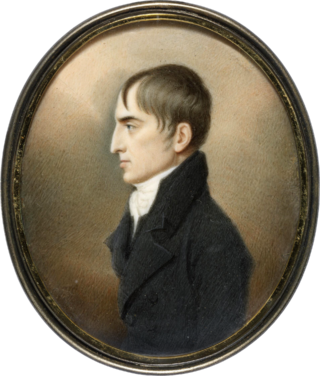
Robert Emmet was an Irish Republican, orator and rebel leader. Following the suppression of the United Irish uprising in 1798, he sought to organise a renewed attempt to overthrow the British Crown and Protestant Ascendancy in Ireland, and to establish a nationally representative government. Emmet entertained, but ultimately abandoned, hopes of immediate French assistance and of coordination with radical militants in Great Britain. In Ireland, many of the surviving veterans of '98 hesitated to lend their support, and his rising in Dublin in 1803 proved abortive.

This article focuses on poetry from the United Kingdom written in the English language. The article does not cover poetry from other countries where the English language is spoken, including Republican Ireland after December 1922.

German Romanticism was the dominant intellectual movement of German-speaking countries in the late 18th and early 19th centuries, influencing philosophy, aesthetics, literature, and criticism. Compared to English Romanticism, the German variety developed relatively early, and, in the opening years, coincided with Weimar Classicism (1772–1805). In contrast to the seriousness of English Romanticism, the German variety of Romanticism notably valued wit, humour, and beauty.

"Ode to the West Wind" is an ode, written by Percy Bysshe Shelley in 1819 in Cascine wood near Florence, Italy. It was originally published in 1820 by Charles Ollier in London as part of the collection Prometheus Unbound, A Lyrical Drama in Four Acts, With Other Poems. Perhaps more than anything else, Shelley wanted his message of reform and revolution spread, and the wind becomes the trope for spreading the word of change through the poet-prophet figure. Some also believe that the poem was written in response to the loss of his son, William in 1819. The ensuing pain influenced Shelley. The poem allegorises the role of the poet as the voice of change and revolution. At the time of composing this poem, Shelley without doubt had the Peterloo Massacre of August 1819 in mind. His other poems written at the same time—"The Masque of Anarchy", Prometheus Unbound, and "England in 1819"—take up these same themes of political change, revolution, and role of the poet.

Romantic poetry is the poetry of the Romantic era, an artistic, literary, musical and intellectual movement that originated in Europe towards the end of the 18th century. It involved a reaction against prevailing Enlightenment ideas of the 18th century, and lasted approximately from 1800 to 1850. Romantic poets rebelled against the style of poetry from the eighteenth century which was based around epics, odes, satires, elegies, epistles and songs.
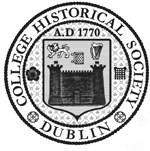
The College Historical Society (CHS) – popularly referred to as The Hist – is a debating society at Trinity College Dublin. It was established within the college in 1770 and was inspired by the club formed by the philosopher Edmund Burke during his own time in Trinity in 1747. This makes the Hist the oldest student society in the world.
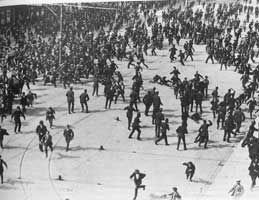
The Dublin lock-out was a major industrial dispute between approximately 20,000 workers and 300 employers that took place in Ireland's capital and largest city, Dublin. The dispute, lasting from 26 August 1913 to 18 January 1914, is often viewed as the most severe and significant industrial dispute in Irish history. Central to the dispute was the workers' right to unionise.

"Hymn to Intellectual Beauty" is a poem written by Percy Bysshe Shelley in 1816 and published in 1817.

John O'Leary was an Irish separatist and a leading Fenian. He studied both law and medicine but did not take a degree and for his involvement in the Irish Republican Brotherhood he was imprisoned in England during the nineteenth century.

Easter, 1916 is a poem by W. B. Yeats describing the poet's torn emotions regarding the events of the Easter Rising staged in Ireland against British rule on Easter Monday, April 24, 1916. The uprising was unsuccessful, and most of the Irish republican leaders involved were executed for treason. The poem was written between May and September 1916, printed privately, 25 copies, and appeared in magazines in 1920 but first published in 1920 in the collection Michael Robartes and the Dancer.

Percy Bysshe Shelley was one of the major English Romantic poets. A radical in his poetry as well as in his political and social views, Shelley did not achieve fame during his lifetime, but recognition of his achievements in poetry grew steadily following his death and he became an important influence on subsequent generations of poets including Robert Browning, Algernon Charles Swinburne, Thomas Hardy, and W. B. Yeats. American literary critic Harold Bloom describes him as "a superb craftsman, a lyric poet without rival, and surely one of the most advanced sceptical intellects ever to write a poem."

Michael O'Neill was an English poet and scholar, specialising in the Romantic period and post-war poetry. He published four volumes of original poetry; his academic writing was praised as "beautifully and lucidly written".

The Witch of Atlas is a major poetic work of the English romantic poet Percy Bysshe Shelley written in 1820 and published posthumously in 1824 in the Posthumous Poems collection. The poem was written in 78 ottava rima stanzas during the period when Prometheus Unbound and The Cloud were written and reflects similar themes. The theme of the poem is a quest for the perfect union.
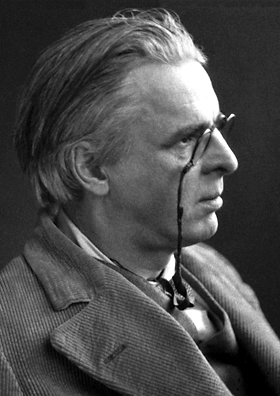
"The Circus Animals' Desertion" is a poem by William Butler Yeats published in Last Poems in 1939. While the original composition date of the poem is unknown, it was probably written between November 1937 and September 1938. In the preface, Yeats suggests that he intended the poem to combine his personal views and impressions with the customs and beliefs of Christian Ireland. The poem was the last work published in Yeats's final collection, with "Politics" following as an envoi. In the poem, the poet uses the desertion of circus animals as an analogy to describe his failure to find inspiration for poetic creation as he seeks for new inspiration. Critics have detected aspects of both Modernism and Postmodern literature in the poem.
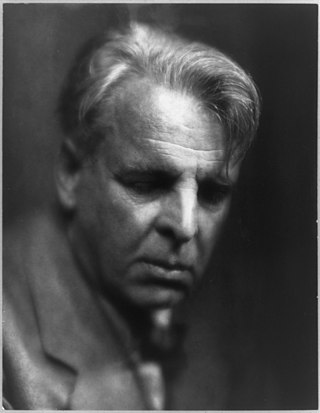
Blood and the Moon is a poem by Irish poet William Butler Yeats written in 1928 and published in the collection The Winding Stair in 1929 before being reprinted in The Winding Stair and Other Poems in 1933. Yeats composed the poem in response to the 1927 assassination of Kevin O'Higgins, the Vice-President of the Free State, whom Yeats had known personally. The poem contains many themes common in Yeats's poems from the 1920s including the "tower", a reference to Thoor Ballylee, which had been the title of a collection of works printed the year before "Blood and the Moon" was published, as well as the "gyre" which had been a major focus of his 1920 poem "The Second Coming".
Responsibilities and Other Poems is a work written by William Butler Yeats.

Romanticism was an artistic, literary, and intellectual movement that originated in Europe toward the end of the 18th century. Scholars regard the publishing of William Wordsworth's and Samuel Coleridge's Lyrical Ballads in 1798 as probably the beginning of the movement, and the crowning of Queen Victoria in 1837 as its end. Romanticism arrived in other parts of the English-speaking world later; in the United States, it arrived around 1820.
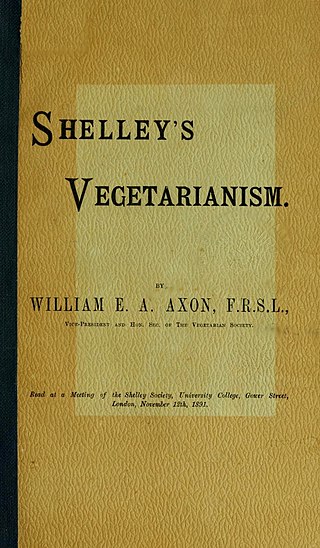
Shelley's Vegetarianism is a 1891 pamphlet on the vegetarianism of Percy Bysshe Shelley by William Axon, published by the Vegetarian Society. It is a printing of a lecture delivered by Axon before the Shelley Society, at University College in 1890.
References
- ↑ "September 1913 Analysis William Butler Yeats : Summary Explanation Meaning Overview Essay Writing Critique Peer Review Literary Criticism Synopsis Online Education". www.eliteskills.com.
- ↑ George Bornstein, "Yeats and Romanticism," The Cambridge Companion to W.B. Yeats, 27. Edited by Marjorie Howes and John Kelly. Cambridge: Cambridge University Press, 2006.
- 1 2 George Bornstein, "Yeats and Romanticism," 27.
- 1 2 George Bornstein, "Yeats and Romanticism," 28.
- ↑ Adele M dalsimer, "By the Irish Political Ballad, Colby Library Quarterly, 12,1 March 1976, p38) http://www.advertiser.ie/galway/article/1479
![]() This article incorporates text from September 1913, by W. B. Yeats, a publication from 1913, now in the public domain in the United States.
This article incorporates text from September 1913, by W. B. Yeats, a publication from 1913, now in the public domain in the United States.